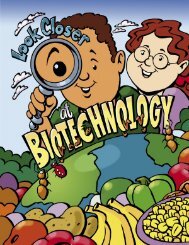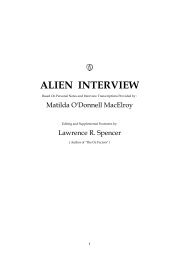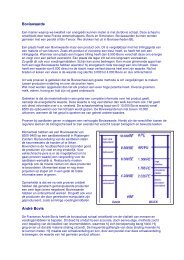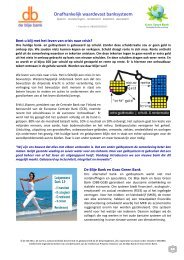De verborgen gevaren van vaccinaties - WantToKnow.nl
De verborgen gevaren van vaccinaties - WantToKnow.nl
De verborgen gevaren van vaccinaties - WantToKnow.nl
Create successful ePaper yourself
Turn your PDF publications into a flip-book with our unique Google optimized e-Paper software.
degeneratie <strong>van</strong> het lichaam optreedt. Gedegenereerde cellen veranderen makkelijker in<br />
een kankercel.<br />
Nogmaals gebrek aan vitamine en kanker<br />
Op 15-6-2009 ontving ik <strong>van</strong> NaturalNews.com een verslag <strong>van</strong> een recente<br />
onderzoekspublicatie betreffende de relatie tussen gebrek aan vitamine D en het ontstaan <strong>van</strong><br />
kanker. Omdat dit een aanvullende oorzaak betreft <strong>van</strong> het ontstan <strong>van</strong> kanker door gebrek<br />
aan vitamine D en dardoor ook <strong>van</strong> gebrek aan fosfor, zal ik dit verslag hieronder weergeven.<br />
[…] Low Vitamin D May Be Root Cause of Cancer<br />
What initially causes cancer to develop? The current scientific model assumes a genetic<br />
mutation begins the genesis of a malignancy. But what if that assumption is wrong and there’s<br />
another key to start of cancer? Scientists at the Moores Cancer Center at the University of<br />
California (UC) in San Diego have raised that possibility. And they’ve come up with another,<br />
brand new model of how cancer develops.<br />
Reporting o<strong>nl</strong>ine in the current Annals of Epidemiology, they point to a host of research that<br />
suggests cancer develops when cells lose the ability to stick together in a healthy, normal way<br />
– and the key factor to this initial triggering of a malignancy could well be a lack of vitamin D.<br />
In the article, Cedric Garland, DrPh, professor of family and preventive medicine at the UC<br />
San Diego School of Medicine, and his research team explain that previous theories<br />
associating vitamin D with many cancers have been tested and confirmed in over 200<br />
epidemiological studies. In addition, more than 2,500 laboratory studies have been conducted<br />
that provide an understanding of the physiological basis of vitamin D’s link to cancer.<br />
According to Dr. Garland, researchers have documented that with enough vitamin D present,<br />
cells adhere to one another in tissue and act as normal, mature epithelial cells. But if there is<br />
a deficiency of vitamin D, cells can lose this stick-to-each other quality, as well as their<br />
identity as differentiated cells. The result? They may revert to a dangerous stem cell-like state<br />
and become cancerous.<br />
In a statement to the media, DR. Garland suggested that much of the process that starts<br />
cancer in the first place could be stopped at the outset by maintaining enough vitamin D in<br />
the body. “Vitamin D may halt the first stage of the cancer process by re-establishing<br />
intercellular junctons in malignancies having an intact vitamin D receptor,” he said. And, he<br />
added, that if diet and supplements restore appropriate levels of vitamin D, the development<br />
of cancer might be prevented. According to Dr. Garland, vitamin D levels can be easily<br />
increased, if needed, by modest supplementation with vitamin D3 in the range of 2000 IU/day<br />
[…]<br />
Hoewel ik zelf denk dat er bij kanker meerdere causale variabelen zijn betrokken – waaronder<br />
verstoord of verzwakt veldcontact en/of genmutaties - lijkt gebrek aan vitamine D toch zeker<br />
op ‘eiwitniveau’ daarbij toch wel een erg belangrijke factor te zijn waar<strong>van</strong> de toename –<br />
opmerlijke genoeg – synchroon lijkt te lopen aan en toename <strong>van</strong> kanker sinds de invoering<br />
<strong>van</strong> steeds grootschaliger vaccinatieprogramma’s en het massale en nog toenemende gebruik<br />
<strong>van</strong> cholesterolverlagende statines, die ook de spiegel <strong>van</strong> vitamine D verlagen.<br />
72







